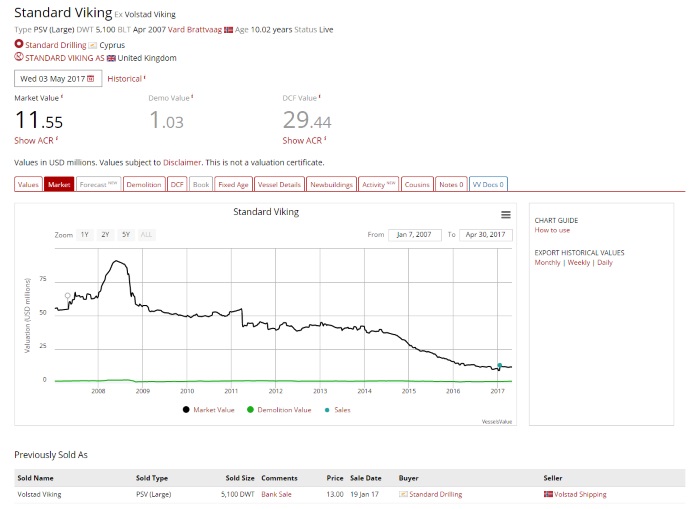Global OSV fleet has a Discounted Cash Flow value 2.5 times higher than its Market Value
VesselsValue (VV), the world’s leading online valuation provider, is launching daily Discounted Cash Flow (DCF) valuations for Offshore Support Vessels (OSVs). This new valuation type looks to increase VesselsValue’s Offshore coverage: VV currently provides daily updated market and demolition values for Offshore Support Vessels (AHTs, AHTS’ and PSVs) and MODUs (including Drillships, Semisubmersibles and Jackups).
The global OSV fleet’s DCF value is currently 2.5 times higher than its market value, today valued at $79.9 billion and $30.9 billion respectively. By comparing DCF values to Market values, customers of VesselsValue can look for buy/sell/hold signals. For instance, if you can purchase a vessel when the market value is lower than the DCF value, you could potentially earn more money over the course of its lifetime than you spent. Therefore, this is a buy signal. On the other hand, if the DCF value is lower than its market value, this implies you can sell the vessel for more than it will earn you for the rest of the vessel’s life. For example, the Standard Viking was bought by Standard Drilling on the 19th January 2017 for $13 million. The day before the sale VesselsValue was providing the large PSV with a market value of $10.1 million and a DCF value of $29.4 million. This meant that, based on VV’s assumptions, the Standard Viking has the potential to earn double the amount Standard Drilling spent on the vessel.

Methodology for Discount Cash Flow Valuations
The VV DCF valuation module calculates the long term value of each asset by calculating the discounted cash flow for every individual vessel for each year of its remaining life. Focusing on the revenue, cost, commission and other factors provided by VV, these assumptions are vessel specific to reflect the differences in earning potential and running costs for vessels of the same type but of different specification and quality. VesselsValue currently also offers DCF values for cargo vessels types (tanker, bulker, container, gas vessels) and customers will be able to modify the assumptions and add fixed charters to calculate custom DCF values.
Source: VesselsValue
HEADLINES
- Do shipping markets want Biden or Trump for the win?
- All 18 crew safe after fire on Japanese-owned tanker off Singapore
- Singapore launching $44m co-investment initiative for maritime tech start-ups
- Cosco debuts Global Shipping Industry Chain Cooperation Initiative
- US warns of more shipping sanctions
- China continues seaport consolidation as Dalian offer goes unconditional